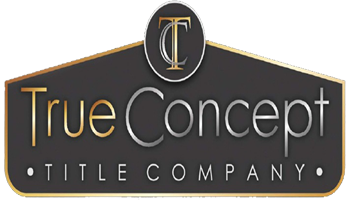If you own a home and are over the age of 62, you may qualify for a reverse home mortgage. This can be an incredibly valuable route to take in order to fully enjoy your retirement.
If you are a senior homeowner and want to take advantage of your home’s equity so you have an additional source of income, True Concept Title can help you through the process! Keep in mind, that there are certain documents you will need to get in order to finalize closing.
Throughout this month, our real estate experts at True Concept Title will explain the reverse mortgage closing process and what documents you need to prepare. In this article, we dive into the following questions:
- What is a Reverse Mortgage?
- What Happens During a Reverse Mortgage Closing?
- What Documents Do You Need at a Reverse Mortgage Closing?
- What Documents Do You Receive at Your Reverse Mortgage Close?
Keep scrolling for the answers!

First, What is a Reverse Mortgage?
When you apply for a reverse mortgage, you are essentially applying for a loan depending on the value of your home. The difference between this kind of loan and a regular mortgage that you might apply for when first buying a home is that you don’t have to make loan payments.
Instead, the balance that you borrowed is due when the indebted person permanently moves out, sells the home, or passes away. This can be a great way to obtain a reliable source of income once you’ve retired – doesn’t that sound like a nice cushion?
What Happens During a Reverse Mortgage Closing?
Closing is the last step of the process when acquiring a reverse mortgage. Any parties involved will need to meet either in person or virtually (depending on the state it’s taking place in) to finalize the loan. There are four main steps to this process:
- The homeowner(s) must complete reverse mortgage counseling to fully understand the terms of the agreement.
- They must then submit a reverse mortgage application.
- A professional must conduct an appraisal of the home in order to open escrow.
- Lastly, they must wait for the underwriter to give the go ahead for the official closing.
Once these steps are complete, you can begin the final closing steps with a title agent, like one of our team members at True Concept Title. Keep in mind that you may need an attorney present at the closing in certain states.
What Documents Do You Need at a Reverse Mortgage Closing?
After your loan application is approved and you’ve confirmed your payment plan with your lender, you’ll be able to meet up with your title agent and any other involved parties to close. On closing day, there is a set of documents you need to bring to the table.
This includes:
- Driver’s license, state-issued ID, or another form of identification (make sure it isn’t expired!)
- Social Security card
- Social Security awards letter
- Home insurance policy
- Proof of property tax payments
- Property title
- Current mortgage statements, if applicable
- Certificate of reverse mortgage counseling
- Bank statements from the previous two months
- Financial statements for all assets (401K, pension plans, annuities, and savings)
- Death certificate of spouse, if applicable
- Durable power of attorney, trust agreement, and conservatorship, if applicable
Make sure to gather all of the appropriate documentation well in advance so that closing day runs as smoothly as possible.
Gathering the necessary documents ahead of time will ensure your reverse mortgage closing runs as smoothly as possible.
Looking for Other Loan Options? > VA Cash-Out Refinance
What Documents Do You Receive at Your Reverse Mortgage Close?
Once you’ve received all of the necessary approvals and compiled the appropriate documents, it’s finally time to close! Work with a title agent at True Concept Title to plan the most convenient close for you and your family – whether that be in-person or over the phone.
When you sign, you will be given a package with the following documents:
HUD-1 Settlement Statement
This form communicates the closing costs, interest rates, mortgages, and net profit of your reverse mortgage.
First and Second Deeds of Trust
The first deed of trust is for the lender, while the second is for the Federal Housing Administration (FHA). This protects you as the holder of the reverse mortgage in the event that the lender fails to fulfil their contractual obligation and allows the FHA to step in. After closing, you must file these documents at your county courthouse.
Related Reading > What’s the Difference between a Deed & a Title?
Reverse Mortgage Agreement
This packet explains the terms of your agreement, how your reverse mortgage will work, and your responsibilities in addition to the lender’s.
Truth in Lending Disclosure and Right of Rescission Form
This allows you as the borrower the right to change your mind and cancel the transaction within 72 hours. Once this period is over you will begin receiving payments depending on the type of reverse mortgage you are receiving.
More Ways to Optimize Your Finances > How Refinancing a Mortgage Works

Make the Most of Retirement with True Concept Title
Applying for a reverse mortgage can be a great way to make the most of retirement as a senior homeowner. But in order for the process to run as smoothly as possible, you’ll want to make sure you have the right documents in order. Otherwise, benefiting from your home’s equity may take much longer than you’d like.
There is a lot to think about at this stage of your life, so we know a reverse mortgage can be an overwhelming process. That’s why we at True Concept Title want to help you make the process as stress-free as can be.
Seniors: You deserve to relax. If you think this kind of loan is right for you, contact our national title specialists based in Tampa Bay today – (813) 263-7168. We can’t wait to help you through this exciting step of your life!



Comments are closed.